Tracking developer productivity metrics is essential for understanding and improving the efficiency of software development workflows. In fast-paced engineering environments, small inefficiencies can accumulate, impacting overall delivery timelines and code quality. By leveraging precise metrics, organizations can identify bottlenecks, assess the impact of new tools, and make data-driven decisions to enhance developer experience.
Now we can add another new metric to help track the development process better: Diff Authoring Time (DAT). DAT is a new metric developed by engineers at Meta to measure the duration required for developers to submit changes, known as “diffs,” to the codebase, which they shared in a recent Meta Tech Podcast. By tracking the time from the initiation of a code change to its submission, DAT offers insights into the efficiency of the development process and helps identify areas for improvement.
Implementing DAT involves integrating a privacy-aware telemetry system with version control systems, integrated development environments (IDEs), and operating systems. This setup allows for the precise measurement of the time developers spend authoring code changes without compromising privacy. The data collected through DAT enables Meta to conduct rigorous experiments aimed at enhancing developer productivity.
For instance, DAT has been instrumental in evaluating the impact of introducing a type-safe mocking framework in Hack, leading to a 14% improvement in authoring time. Additionally, the development of automatic memoization in the React compiler resulted in a 33% improvement, and efforts to promote code sharing have saved thousands of DAT hours annually, achieving over a 50% improvement.
The significance of DAT lies in its ability to provide a precise yet comprehensive measure of development productivity, facilitating data-driven decisions to enhance engineering efficiency. By aligning internal development workflows with an experiment-driven culture, DAT supports continuous improvement in software engineering practices.
As highlighted in the Meta Tech Podcast, engineers Sarita and Moritz discuss the challenges of measuring productivity, the implementation of DAT, and the new capabilities it unlocks for developers. Their insights underscore the importance of accurate productivity metrics in fostering an environment of continuous improvement within Meta’s engineering teams.
In summary, Diff Authoring Time serves as a tool for Meta to assess and enhance developer productivity, enabling the company to make informed decisions that streamline workflows and improve the overall efficiency of its engineering processes.










